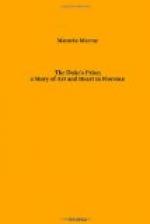As the troop emerged from a narrow street and came full upon the bright and sunny piazza, near the splendid shaft of the Campanile, the gorgeous equipage of the Grand Duke was passing the spot. The monarch was returning from a morning drive in the Casino with a small retinue, and accompanied by one or two strangers of distinction. The group paused for a moment to witness the passing of the duke and his suite, and then turned gaily towards their hotel to dine, the duke forming a new theme of conversation to those who, conversing under the disadvantage of but partially understanding each other, from the variety of tongues among them, ever chose the most visible subject for comment.
“What a brilliant turn-out,” said one, in honest admiration.
“Those leaders are as proud as their master,” said another.
“But he becomes his state well, if he is proud,” answered a third.
“Newman couldn’t get up a better four in hand,” said the first speaker, a young Londoner.
“Who is that by the side of the duke?” asked one.
“The English consul,” replied his countryman; “you ought to know him.”
“The whole affair now is wanting to my eye,” said a young, sentimental artist.
“And what does it want, pray, Mister Critic?” asked the Englishman.
“A woman.”
“Egad, that’s true! There should be a woman in the picture, if it was to be painted, if only to introduce color.”
“Don’t be so mercenary,” added the other.
And the group thus idly conversing lounged on their way to dine. But see, one of their number still lingers near the base of the shaft, apparently absorbed in admiring its beautiful proportions; his pale but fine intellectual features overspread by a spirit of admiration as he beholds the column. But still there is some other motive than mere curiosity that engages him thus; he seems to have thus designedly dropped the company of the party he was just with. Now suddenly turning and satisfying himself that his late companions were out of sight, the young artist-for so his appearance evidently bespoke him-slowly and sadly retraced his steps toward the grand gallery.
The expression of his countenance was that of suffering and physical pain, as well as of mental inquietude; but his late companions had none of them noticed or cared for this. They could take especial cognizance of the points of excellence in the duke’s horses, but not of the grief that shaded a fellow-being’s countenance. No, the single artist, who now retraced his steps from the base of the Campanile, let his cause for sadness arise from whatever source it might, was alone in his sufferings, and without any one to share his sorrows.
Once or twice he seemed to hesitate and half turn round again, as if to join the party he had left; but some inward prompting appeared to prevent him from doing so, and once more he walked on by the same street which he had just came. A sigh now and then heaved his breast, as though some mental or physical suffering moved him, but his form was erect, and his step not that of one weakened by physical disease. And yet in looking upon him, an instinctive desire would have possessed the careful observer to offer him aid in some form.




